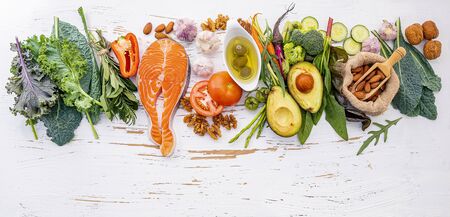1. Why Collagen Matters for Skin Health
Collagen is one of the most important proteins in your body, especially when it comes to keeping your skin looking youthful and firm. It acts like a natural support system under your skin, helping maintain elasticity, hydration, and smooth texture. As we age, our bodies produce less collagen, which can lead to sagging, dryness, and the appearance of fine lines.
Think of collagen as the glue that holds everything together—when its abundant, your skin stays plump and resilient. But starting in your mid-20s, collagen production starts to slow down. By the time youre in your 40s or 50s, you might notice more visible signs of aging. That’s where collagen-rich foods come into play—they can help support your bodys natural ability to produce this essential protein.
How Collagen Supports Skin Health
| Benefit | How Collagen Helps |
|---|---|
| Skin Elasticity | Keeps skin firm and helps prevent sagging |
| Hydration | Improves moisture retention for a healthy glow |
| Youthful Appearance | Reduces the look of fine lines and wrinkles |
| Healing & Repair | Supports skin regeneration after sun exposure or damage |
Why Natural Sources Matter
While there are plenty of supplements on the market, getting collagen from whole foods offers additional nutrients that support overall health. Plus, it’s a more sustainable and balanced way to nourish your body. In upcoming sections, we’ll explore which foods are naturally rich in collagen or help boost its production—so you can glow from the inside out.
2. Bone Broth: A Collagen Powerhouse
If you’re looking for a delicious and natural way to boost your skins elasticity, bone broth is definitely worth adding to your diet. Its more than just a comforting soup — it’s a time-tested remedy packed with collagen, amino acids, and essential minerals that help rejuvenate your skin from the inside out.
What Makes Bone Broth So Special?
Bone broth is made by simmering animal bones (like chicken, beef, or fish) for several hours — sometimes even up to 24 hours. This slow cooking process breaks down the bones and connective tissues, releasing collagen and other nutrients into the broth. The result? A nutrient-rich liquid that supports your skin, joints, hair, and nails.
Key Skin-Boosting Nutrients Found in Bone Broth
| Nutrient | Skin Benefits |
|---|---|
| Collagen | Improves skin elasticity and hydration |
| Glycine | Supports tissue repair and reduces inflammation |
| Proline | Aids in collagen production and skin structure |
| Glutamine | Helps maintain skin barrier function |
| Minerals (Calcium, Magnesium) | Nourish cells and promote healthy skin turnover |
Easy Ways to Add Bone Broth to Your Diet
- Sip it warm as a nourishing drink between meals
- Use it as a base for soups or stews
- Add it to grains like rice or quinoa for extra flavor and nutrients
- Create sauces or gravies using bone broth instead of water or stock cubes
The best part? You can make bone broth at home with simple ingredients — just bones, water, vinegar (to help extract minerals), and vegetables. Or if youre short on time, many grocery stores across the U.S. carry high-quality bone broth in the refrigerated or frozen sections. Look for brands with minimal ingredients and no added preservatives to get the most benefits for your skin.

3. Fatty Fish for Omega-3 and Collagen Support
When it comes to keeping your skin smooth, firm, and glowing, fatty fish like salmon, mackerel, and sardines are true superstars. These fish are packed with omega-3 fatty acids—healthy fats that your body cant produce on its own but are essential for maintaining skin health and supporting collagen production.
Why Omega-3s Matter for Your Skin
Omega-3s help reduce inflammation in the body, which can break down collagen and cause premature aging. They also strengthen the skin barrier, keeping moisture in and environmental irritants out. This helps your skin stay hydrated, soft, and more elastic.
Collagen-Boosting Nutrients in Fatty Fish
Besides omega-3s, fatty fish also provide other key nutrients that support collagen formation:
| Nutrient | Benefit for Skin | Found In |
|---|---|---|
| Omega-3 Fatty Acids | Reduce inflammation and protect collagen | Salmon, Mackerel, Sardines |
| Protein | Provides amino acids needed to build collagen | Tuna, Salmon, Herring |
| Zinc | Aids in collagen synthesis and repair | Sardines, Anchovies |
| Selenium | Protects skin from oxidative stress | Halibut, Tuna |
Best Ways to Enjoy Fatty Fish
You don’t have to eat sushi every day to get the benefits of fatty fish. Here are a few easy ways to add them into your weekly meals:
- Bake or grill salmon fillets with herbs and lemon for a simple dinner.
- Add canned sardines or tuna to salads or whole-grain crackers for a quick lunch.
- Try smoked mackerel or herring as a flavorful breakfast option on toast.
Incorporating fatty fish into your diet just two to three times per week can make a noticeable difference in your skins hydration and elasticity. Its a delicious way to naturally support your bodys collagen levels.
4. Eggs and Their Collagen-Boosting Benefits
Eggs are a staple in many American kitchens—and for good reason. Theyre not only versatile and budget-friendly, but also packed with nutrients that support healthy skin. When it comes to collagen production, eggs, especially the whites, are a natural powerhouse.
How Eggs Help Your Skin
Collagen is made up of amino acids, and egg whites are rich in proline, one of the key amino acids your body needs to build collagen. While eggs themselves dont contain collagen like bone broth or fish skin, they provide the building blocks your body uses to make it on its own.
Key Nutrients in Eggs That Support Collagen Synthesis:
| Nutrient | Function |
|---|---|
| Proline (found in egg whites) | Essential for collagen formation |
| Lysine | Supports collagen cross-linking for skin firmness |
| Vitamin B2 (Riboflavin) | Helps with cell repair and regeneration |
| Selenium | Protects skin cells from damage |
How to Add More Eggs into Your Diet
You don’t have to eat plain boiled eggs every day—unless you want to! Here are some easy ways to include more eggs into your meals:
- Add a poached egg on top of avocado toast for a protein boost
- Mix egg whites into smoothies for a low-fat protein source
- Bake veggie-packed frittatas for a quick breakfast or lunch option
With their rich nutrient profile, eggs are an easy and effective way to support your skin’s elasticity from the inside out.
5. Collagen-Rich Fruits and Vegetables
When it comes to boosting your skin’s elasticity naturally, fruits and vegetables rich in vitamin C are true game-changers. Vitamin C plays a vital role in collagen synthesis — the process that helps your body produce and maintain collagen, which keeps your skin firm and youthful.
Why Vitamin C Matters
Your body cant store or produce vitamin C on its own, so its important to get it through your diet. This powerful antioxidant not only supports collagen production but also helps protect your skin from free radical damage caused by sun exposure and pollution.
Top Fruits and Veggies That Support Collagen Production
Incorporating a variety of colorful fruits and vegetables into your meals is an easy way to support healthy skin. Here are some of the best options:
| Food | Vitamin C Content | Skin Benefits |
|---|---|---|
| Oranges | ~70 mg per medium orange | Boosts collagen synthesis, brightens skin |
| Strawberries | ~85 mg per cup | Fights free radicals, supports skin firmness |
| Kale | ~80 mg per cup (raw) | Strengthens skin barrier, promotes elasticity |
| Broccoli | ~81 mg per cup (chopped) | Rich in antioxidants, aids collagen formation |
| Red Bell Peppers | ~95 mg per half-cup (raw) | Stimulates collagen, reduces wrinkles |
| Pineapple | ~79 mg per cup | Aids digestion and collagen development |
Simple Ways to Add These Foods to Your Diet
- Toss berries into your morning yogurt or oatmeal.
- Add kale or spinach to smoothies for a nutrient-packed start.
- Munch on sliced bell peppers as a crunchy snack.
- Squeeze fresh lemon or lime juice over salads or grilled dishes.
- Create vibrant fruit salads with oranges, strawberries, and pineapple.
The Bottom Line on Fruits and Veggies for Skin Health
Nutrient-dense fruits and vegetables are more than just good for your overall health — they’re essential allies in keeping your skin looking radiant and youthful. By focusing on foods high in vitamin C, you’re giving your body the tools it needs to build strong, elastic collagen naturally.


